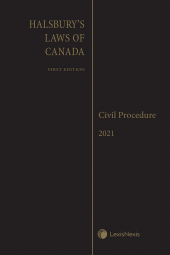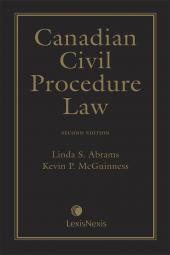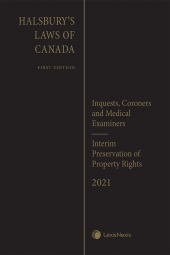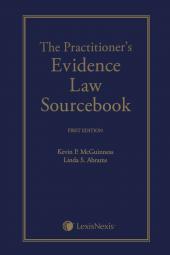The Practitioner's Evidence Law Sourcebook
One Year Subscription Only Terms
Subscribers receive the product(s) listed on the Order Form and any Updates made available during the annual subscription period. Shipping and handling fees are not included in the annual price.
Subscribers are advised of the number of Updates that were made to the particular publication the prior year. The number of Updates may vary due to developments in the law and other publishing issues, but subscribers may use this as a rough estimate of future shipments. Subscribers may call Customer Support at 800-833-9844 for additional information.
Subscribers may cancel this subscription by: calling Customer Support at 800-833-9844; emailing customer.support@lexisnexis.com; or returning the invoice marked 'CANCEL'.
If subscribers cancel within 30 days after the product is ordered or received and return the product at their expense, then they will receive a full credit of the price for the annual subscription.
If subscribers cancel between 31 and 60 days after the invoice date and return the product at their expense, then they will receive a 5/6th credit of the price for the annual subscription. No credit will be given for cancellations more than 60 days after the invoice date. To receive any credit, subscriber must return all product(s) shipped during the year at their expense within the applicable cancellation period listed above.
Détails des produits
This practice-oriented sourcebook, authored by a seasoned lawyer with the Ontario Ministry of the Attorney General and a Master of the Ontario Superior Court of Justice, contains a comprehensive digest of Canadian evidence law. The book covers the law of evidence as applied in both civil and criminal proceedings, and captures general evidentiary principles contained in thousands of selected excerpts from case law and statutes, supplemented with authoritative commentary. By providing the key passages of actual cases and statutes (as opposed to a discussion of theory), this book serves as a practical research tool for students, litigators and adjudicators alike, well suited to the preparation of an opinion, argument or factum.
Special Features
- Provides an easy-to-understand explanation of the technical aspects of certain types of evidence, such as DNA, breathalyzer samples, fingerprints, document and handwriting analysis. Examines how certain types of evidence are used, and their strengths and weaknesses
- Contains key passages from leading cases and other primary authorities that deal with the evidentiary principles set out in the book; there's no need to look up a case to retrieve the actual words of the court
- Provides an international perspective on the law of evidence; the book refers to case law from other Commonwealth countries and the United States
What Makes This Book Unique?
- While most books discuss evidence law from a theoretical standpoint, this books focuses on the day-to-day use of evidence in the courts
- Covers every aspect of evidence, from expert witnesses to documentary evidence to criminal evidence
- This book gives ready access to statements of law and salient passages from relevant and leading cases, without the need to go to the library to perform hours of legal research to determine - or refresh one's memory of - first principles
- It provides such extensive extracts from the leading primary authorities.
- Easily portable
- Extremely practice-oriented: for example, this book provides sample questions for use in qualifying (or challenging the qualifications of) expert witnesses or the testimony given by them
- The book also provides the most common objections to certain types of evidence
Who Should Read This Book?
- Civil & criminal litigators - Litigation lawyers are often looking for a passage from the case law that stands for a particular evidentiary principle and a restatement of its applicability; this book fulfills that need
- Judges - Judges are frequently called to make rulings on evidence, sometimes without advanced warning. Judges will have at their fingertips a resource to permit them to reliably make comment on issues of evidence, with reference to seminal passages from the cases that inform that comment
- Law students - Broad overview of the law of evidence, covering both civil and criminal evidentiary principles, with a global perspective
- Law libraries - A valuable addition to any collection of law books dealing with the law of evidence
- Expert witnesses - Experts can learn how to be better witnesses: the book discusses, in a plain and succinct manner, how certain types of evidence are treated in court, and the strengths and weaknesses of such evidence
Table des matières
Preface
Chapter 1 - Introduction
Chapter 2 - The Nature of Evidence
Chapter 3 - Key Aspects of Proof
Chapter 4 - Standards And Burden of Proof
Chapter 5 - Presumptions
Chapter 6 - Witnesses
Chapter 7 - Special Classes of Witness
Chapter 8 - Expert Witnesses
Chapter 9 - Documentary Evidence
Chapter 10 - Special Types of Evidence
Chapter 11 - Inadmissible and Conditionally Admissible Evidence
Chapter 12 - The Investigative Process
Chapter 13 - Hearsay Evidence
Chapter 14 - Privileges
Chapter 15 - Criminal Evidence
Chapter 16 - The Criminal Trial Process
Produits liés
-
 Halsbury's Laws of Canada – Civil Procedure (2021 Reissue)Date de sortie: July 30, 2021335,00 $
Halsbury's Laws of Canada – Civil Procedure (2021 Reissue)Date de sortie: July 30, 2021335,00 $ -
 Canadian Civil Procedure Law, 2nd EditionDate de sortie: August 31, 2010495,00 $
Canadian Civil Procedure Law, 2nd EditionDate de sortie: August 31, 2010495,00 $ -
 Halsbury's Laws of Canada – Inquests, Coroners and Medical Examiners (2021 Reissue) / Interim Preservation of Property Rights (2021 Reissue)Date de sortie: August 24, 2021335,00 $
Halsbury's Laws of Canada – Inquests, Coroners and Medical Examiners (2021 Reissue) / Interim Preservation of Property Rights (2021 Reissue)Date de sortie: August 24, 2021335,00 $
 Lexis Nexis
Lexis Nexis 